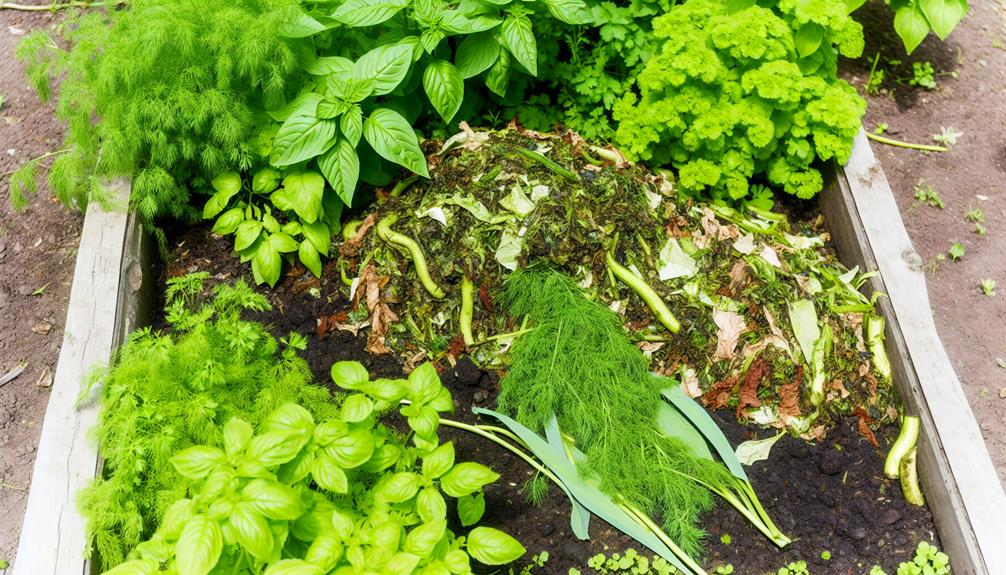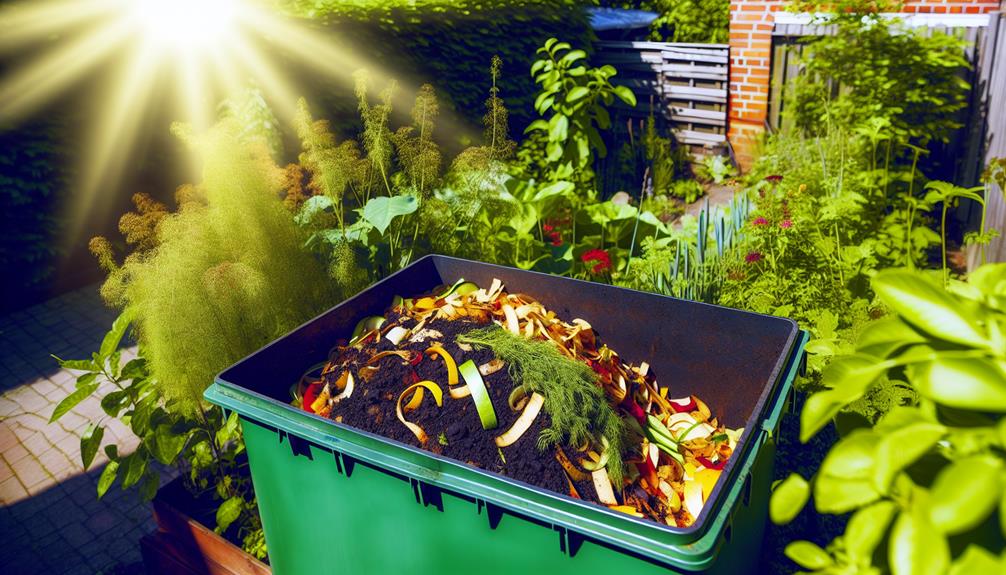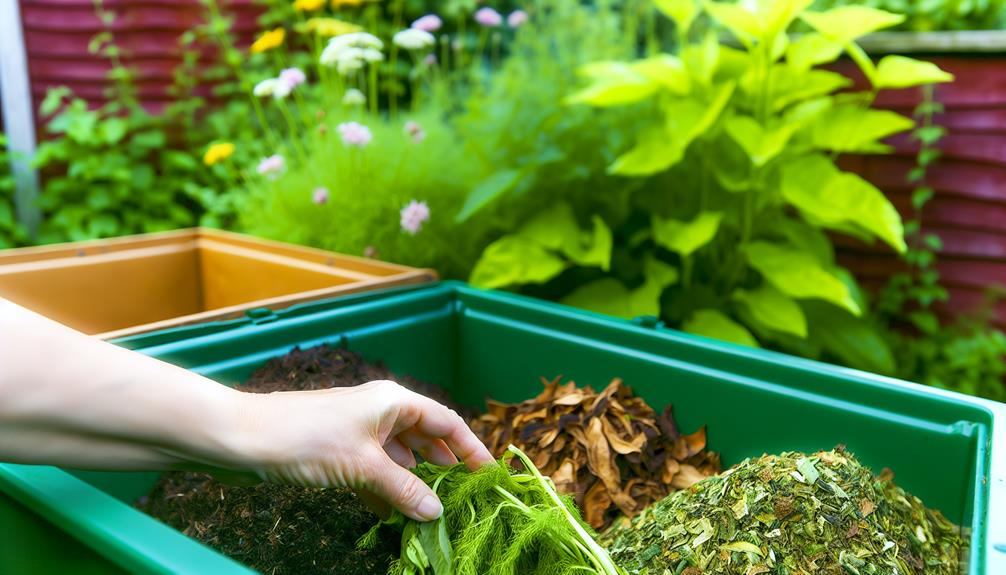

You can absolutely compost stale herbs to enrich your garden soil and promote healthy plant growth. Start by drying and chopping the herbs to prevent excess moisture and enhance decomposition. Make sure you balance them with green and brown materials in your compost pile for efficient breakdown.
Turn the pile regularly to maintain aeration and monitor moisture levels, keeping it like a wrung-out sponge. Properly composted herbs release essential nutrients such as nitrogen, phosphorus, and potassium, making your soil more fertile. Keep your compost well-managed, and you’ll soon see the benefits, such as healthier plants and nutrient-rich soil. Explore more to optimize your composting process.
Composting stale herbs enriches your soil with essential nutrients. When you add these herbs to your compost pile, they break down and release important elements like nitrogen, phosphorus, and potassium. These nutrients are essential for healthy plant growth. By composting, you’re participating in nutrient recycling, ensuring that nothing goes to waste.
Your compost pile becomes a powerhouse of soil enrichment. As herbs decompose, they transform into a rich, dark humus that improves soil structure and fertility. This humus helps retain moisture, reducing the need for frequent watering and enhancing plant resilience. By composting these herbs, you’re creating a thriving environment for your garden, making it more vibrant and productive.
Moreover, composting stale herbs fosters a sense of community and shared responsibility towards the environment. You’re not just enriching your soil; you’re contributing to a sustainable cycle that benefits everyone. As you compost, you reduce landfill waste and lower your carbon footprint. This simple act connects you with others who are committed to nurturing the earth.
Also Read: Can You Compost Cat Manure?
To get the most out of your composting efforts, it’s important to properly prepare stale herbs before adding them to your compost pile. Proper preparation not only guarantees efficient decomposition but also maximizes the benefits for your compost.
Here are three steps to make sure your stale herbs are compost-ready:
Integrate the prepared stale herbs into your compost pile by layering them with other organic materials for efficient decomposition. Start by adding a thin layer of your chopped or crushed stale herbs, then cover them with a mix of green and brown materials. This layering helps maintain the right balance for composting, ensuring the herb nutrients are effectively broken down and utilized by the microorganisms.

When you add herbs, consider the compost timing. Freshly added herbs will decompose faster if they’re mixed well with other materials like grass clippings, kitchen scraps, and dried leaves. This combination boosts microbial activity, which is essential for breaking down the organic matter.
Remember, it’s important to chop or crush the herbs before adding them to the pile. Smaller pieces decompose more quickly and evenly, ensuring the herb nutrients are thoroughly integrated into your compost.
Turn your compost pile regularly to keep it aerated and to speed up the decomposition process.
Also Read: Can You Compost Celery?
Maintaining a balanced compost pile guarantees that your stale herbs and other organic materials break down efficiently and produce nutrient-rich compost. To achieve this balance, you need to manage three key factors: the carbon-to-nitrogen ratio, soil pH, and compost moisture.
Here’s how you can make sure your compost is well-balanced:
Also Read: Can You Compost Bones?
When your compost pile isn’t breaking down as expected, identifying the problem quickly can save you time and effort.

First, check your moisture levels. Your compost should be as damp as a wrung-out sponge. If it’s too dry, materials won’t decompose efficiently. Add water and mix to distribute moisture evenly. If it’s too wet, decomposition can slow due to lack of oxygen. Turn your pile more frequently and add dry materials like straw or shredded newspaper to balance it out.
Next, consider the presence of compost pests. While some bugs are beneficial, an overabundance of pests like flies or rodents might indicate an imbalance. Avoid adding meat, dairy, or overly oily foods, as these attract unwanted visitors. To deter pests, cover food scraps with a layer of brown materials like leaves or cardboard.
Yes, composting stale herbs can attract pests if you don’t practice good compost hygiene. To guarantee pest prevention, mix the herbs well into your pile and maintain a balanced compost to keep your community pest-free.
You should avoid composting herbs treated with herbicide residues or those that are invasive species. Taking this step guarantees that your compost stays healthy and safe, fostering a sense of community and responsibility in your gardening group.
You’re probably wondering about herb decomposition in your compost. Typically, herbs take a few weeks to decompose, adding valuable nutrients to your compost. Enjoy the compost benefits and feel good about reducing waste together!
Yes, dried herbs compost differently than fresh herbs. They absorb moisture, aiding in moisture retention. Due to their concentrated state, they contribute nutrients more slowly, fostering a balanced compost pile and making you feel like a composting pro.
Yes, composting herbs can affect your compost pile’s smell. The herb aroma might intensify, but with good odor management, you’ll maintain a balanced scent. Embrace the community of composters and share tips for a harmonious pile!
To conclude, you can successfully compost stale herbs by following a few simple steps. Prepare the herbs by chopping them into smaller pieces, ensuring they decompose efficiently.
Add them to your compost pile, balancing with brown materials to maintain the right carbon-to-nitrogen ratio.
Regularly turn your compost to aerate it, aiding decomposition.
By troubleshooting common issues like odor or pests, you’ll keep your compost healthy and productive, ultimately enriching your garden soil.

Don't let aphids, slugs, and caterpillars ruin another plant. Take back control with simple, natural methods that actually work.